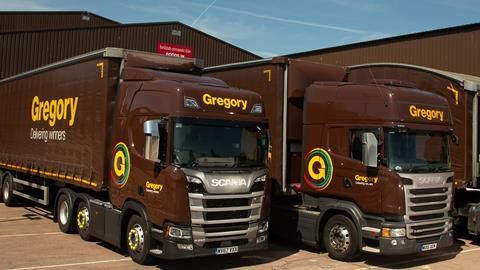Gregory Trading Holdings saw pre-tax profits fall by almost a third last year as the company battled soaring inflation, rising energy costs, rocketing business rates, and long lead-in times for vehicles and spare parts.
The family-owned firm includes Gregory Distribution, ARR Craib Transport, Pollock (Scotrans) and Pollock Express, which the group acquired in 2021, and a joint venture with Hayton Coulthard.
It is also a member of Palletways, Palletline and HazChem, boasts over 400 customers and operates a fleet of over 1,200 vehicles and around 2,000 trailers.
It specialises in ambient and temperature controlled palletised services, ambient and chilled warehousing, e-fullfillment and parcel deliveries, and milk collection and shipment and employs around 3,000 staff across 50 sites across the UK, from Aberdeen to Truro.
In September 2023, at the end of its financial year, the group demerged the property element of the former Gregory Distribution Holdings from the rest of the group, creating two new groups.
These are Gregory Warehouse Holdings, which owns all of the properties previously held within the Gregory Group, and Gregory Trading Holdings, which is the logistics arm.
Reporting its results for the year to 30 September 2023, Gregory Trading Holdings unveiled a slight rise in turnover to £341.6m (2022: £335.6m) with pre-tax profit falling to £8m, down from £11.9m.
The profit and loss account for each year for the group is comparable, as the demerger occurred one day before the period ended.
Within the group, Gregory Distribution saw turnover rise to £276.2m (2022: £262.3m) whilst pre-tax profit continued to fall to £6.6m, down from £8.9m the previous year.
ARR Craib Transport saw turnover decline to £46.6m (2022: £47.4m) in the period with the company delivering a pre-tax loss of £445,000 compared to a pre-tax profit of £467,000 the year before.
Pollock (Scotrans) also delivered falling turnover in the year, from £29.3m down to £25m. Pre-tax profit took a dive to £1.2m (2022: £2.3m)
In its business review of the results, the group describes a “highly challenging” year which began with rocketing inflation, and soaring energy and fuel prices, which impacted on the cost of replacement vehicles, trailers and parts.
Lead times for new vehicles and trailers also remained high with some kits taking two years to arrive, leading to higher maintenance costs and reduced vehicle availability. This particularly hit the group’s pallet network and English shared user transport businesses.
The milk delivery business in west Wales was also hit by fleet reliability and long lead times for repairs, compounded by unusually icy conditions in the early winter.
The review also noted that from April business rates increased over 30% across many of the group’s sites. The group was also hit by a £1.4m increase in interest costs across the year.
Despite winning additional business from both existing customers and new customers during the year, the review said this was partly offset by the loss of a customer at one of the group’s Somerset warehouses, which had a “significant” impact on its pallet network transport business.
The review added that in Q2 and Q3 the impact of the cost of living crisis on volume deepened, “with a significant proportion of our customers seeing reduced demand”.
This was compounded during the summer by poor weather and a continuing fall in consumer confidence, which the review said resulted in the group’s seasonal peak being “significantly lower than anticipated”.
The profitability of the group’s Scottish warehouses was also hit in Q4 as the economic downturn hit stock volumes, resulting in a “significant increase” in warehouse capacity.
The review concluded that “despite a hugely challenging year”, the business continued to grow organically, with new and existing customers. Turnover in the first half of the year increased by nearly £10m versus the prior year. However, in the second half of the year, the underlying growth in revenue was offset by the impact of lower fuel prices, lower volumes and the slowing economy.
It added: ”During the year, the leadership team has worked hard to mitigate the impact of higher interest rates, inflationary challenges and volume declines with a combination of restructuring, fixed cost reduction and cost recovery. The benefits of these mitigations will not be fully realised until the next financial year.”
Turning to future developments, the review said that despite a challenging 2023 the directors are optimistic about the group’s growth prospects.
It noted that during late 2023 and into 2024 it won new customers, commitments to increase the use of its Scottish warehouses and also implemented a restructuring in a number of areas.
It added: “We expect the economic climate to remain difficult for all businesses for at least the first six months of 2024. However, while this presents challenges, we believe we are well positioned with our unique family business culture and our unique service offering to organically grow our market share.
”We are actively working with potential new customers, and through our strong partnership, we anticipate further growth with existing customers.”

















